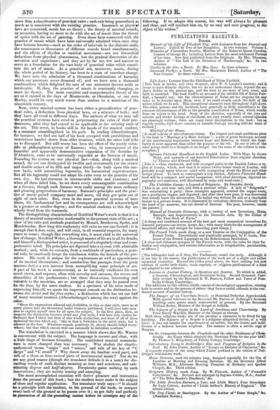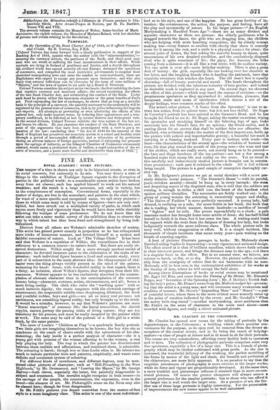PUBLICATIONS RECEIVED.
BOOKS.
Memoir of the Life of Elizabeth Fry; with Extracts from her Journal and Letters. Edited by Two of her Daughters. In two volumes. Volume L
Memoirs of Viscountess Sundon, Mistress of the Robes to Queen Caroline, Consort of George IL; including Letters from the most celebrated Persona of her time. Now first published from the Originals. By Mrs. Thomson, Author of " The Life of the Dutchess of Marlborough," Eke. In two volumes.
Castles in the Air; a Novel. By Mrs. Gore. In three volumes. Jeremiah Parkes; a Novel. By Mrs. Mackenzie Daniel, Author of " The Poor Cousin." In three volumes.
Life-Lore: Lessons from the Childhood of Nolan Fairfield. [This book is tender, and even eloquent, after W. S. Landor's manner; and it seems to have didactic objects; but we do not understand them, beyond the au- thor's dislike to the present age, and his wish to see more of love, trust, and faith in mankind. The book itself is an account of the childish life of Nolan Fair- field, a farmer's son: but the circumstances of Nolan are too singular for any rules to be founded upon them, even if we could clearly catch the drift of the writer, which we do not. This exceptional character runs throughout Life-Lore. The other persons and the incidents have generally as little resemblance to the common circumstances of life as the peculiar constitution of Nolan which results from an injury to his head. Some of the sketches, especially Of the joys and sorrows and tender feelings of childhood, are very sweetly done; several episodes are pleasingly written; there are many rural descriptions in the book: but as regards results, Life-Lore consists of amiable feelings running wild for want of method.]
Mischief of the Muses. [A small volume of miscellaneous verses. The longest and most ambitious piece in the book is " Marriage a la Mode Antique"; a sort of grave burlesque account of the matrimonial negotiation between Isaac and Rebecca, in which the fami- liarity is more apparent than either the purpose or the wit. In one or two of the other poems there is a thought or an image; but the mass of the volume is com- monplace.] Sylvan's Pictorial Handbook to the English Lakes. With Maps by James Wyld, and upwards of one hundred Illustrations from original sketches, by Thomas and Edward Gilks.
[This is a clear, condensed, and well. arranged guide to the English Lakes; a re- gion of beauty, which, now that it is within twelve hours' reach of London, will probably tempt many who are sated with scampering about the Rhine and other foreign places. To such as contemplate a trip thither, Sylvan's Pictorial Hand- book will be a compact and useful companion; with clear directions, digested to- pography and statistics, well illustrated by maps and wood-cuts.]
. The Unbidden Guests; a Legend of Belgravia. By Swynfen Jervis.
[This is an over tree tale, told with a poetical relish. A lady of "Belgravia" was entertaining a party: three strangers appeared, entered the supper-room, ate a prodigious supper, and departed; and after they were gone, it was discovered that nobody knew the adventurers. The ballad was written for sale at a charitable bazaar in a private house. It is illustrated by caricature sketches, evidently from the hand of an amateur, but not devoid of humour. The poet, however, excels the painter.]
Manual of Domestic Economy; with a variety of new Inventions, Hints, Receipts, and Improvements in the Domestic Arts. By the Editor of " The Year-Book of Facts."
[A cheap and condensed account of the best and most economical inventions for domestic purposes—as stoves, lamps, &c.; with many hints for the management of household affairs, and receipts for concocting good things.] The French Verbs made Easy; or a new Treatise on the Conjugation of the French Verbs. Theoretically and practically arranged, by F. Lorin, Pro- fessor of the French Language at the Robertsonian Institution.
[A clear and elaborate synopsis of the French verbs, with the rules for their for motion and conjugation, and various information as to irregularities, peculiarities, or idioms]
[The bibliopoles look as if they, like Parliament, would rise early. Although it is not late in the season, the publications of the week are of a slight and rather autumnal character. Beyond the trifles noted above, we have nothing but new -editions of useful little books, trade reprints, or religious publications of a kind not adapted to our columns.
Lessons in Ancient History, in Question and Answer. To which is added; a General, Chronological, and Scriptural Index. Second thousand. Caron fully revised by the Reverend B. W. Beatson, Fellow and Tutor of Pem- broke College, Cambridge.
The additions to this edition chiefly consist of chronological appendices, relating both to events and to the persons of rulers: they form a useful addenda tithe con- densed account of ancient history.
The Danger of an Uncertain Sound; or Doctrinal Defection Apprehended. With special reference to the Reverend Mr. Purees of Jedburghs Sermons touching some points mach controverted at present. By the Reverend William Sorley, Minister of the Gospel at Selkirk.
The Sojourn of a Sceptic in the Land of Darkness and Uncertainty. By Peter Ilately Waddell, Minister of the Gospel at Girvan.
Both these religions books are of too peculiar a character to be fitted for lay handling. The Sojourn of a Sceptic is a religious allegorical fiction, of a wild kind: it does not exhibit the experiences of an infidel, but the doubts and indif- ference of a believer become scepticaL The manner is often a servile copy or Bunyan.
On the Connexion between the Prophetic and the other Evidences of Chris- tianity. An Essay which obtained the Norrisian Prize for the year 1847. By Thomas L. Kingsbury, of Trinity College, Cambridge.
Introductory Essay to Doddridge's Rise and Progress of Religion in else Soul. By John Foster, Author of " Essays on Decision of Character," doe. A separate reprint of the essay which Foster prefixed to his edition of Dod- dridge's well-known work.
Home Sermons, each six minutes long, designed especially for the Use of Families at Morning and Evening Devotion. By the Reverend Alfred Williams' M.A.,. Alternate Morning Preacher at Berkeley and Quebec Chapels, &c. Third edition.
Scripture History made Easy. By W. Pinnock, Author of " Pinnock's Catechisms," &c. Revised and enlarged by Ingram Cobbin, M.A., Author of " The Bible Reader's Handbook," &c.
The Little Bracken-Burners, a Tale; and Little Mary's Four Saturdays. By Lady Calcott, Author of " Little Arthur's History of England." This second edition.
The Dog-Fiend; or Snarleyyow. By the Author of "Peter Simple," acc. (Standard Novels.)
Bibliothigue des Mimoires relatifs a 1751W toire de France pendant le Dix- huitieme Sack Avec Avant-Propos et Notices, par M. Fs. Barri4re. Tomes VII. and VEIL The seventh volume contains the Memoirs of Weber, foster-brother of Marie Antoinette; the eighth volume, the Memoirs of Madame Roland, with her sketches of persons and events relating to the Revolution.]
PAMPHLET.
On the Operation of the Bank Charter Act of 1844, as it affects Commer- cial Credit. By R. Torrens, Esq. F.R.S.
[Colonel Torrens has come forward with a timely publication in support of the Banking Act of 1844, against what the author calls the "miSconceptionists,"— meaning the currency doctors, the partisans of the Bank, and those good easy men who are wroth at suffering the least inconvenience in their affairs. While myriads are dying in Ireland of pestilence and famine, and a dearth throughout the civilized world has caused scarcity all over Europe, deranged the operations of commerce, and compelled the most restrictive governments to suspend their cherished monopolizing laws and enter the market as corn-merchants, there are Englishmen who expect to escape any pressure upon themselves, and who also fancy that natural inflictions can be overcome by the issue of some millions of "flimsies," and the laws of nature he set aside by a Board of Directors.
Colonel Torrens considers his subject under two heads; the first unfolding the laws that regulate currency and monetary affairs; the second examining the effects of the late Bank Charter Act, and scrutinizing the conduct of the Bank. Under each head he proves either the innocuous character or the great benefits of Peel's act. First expounding the law of exchanges, he shows that as long as a metallic basis is the principle of a currency, the quantity necessary to the community will be regulated by the general state of commerce, that is, by prices influencing the imports and exports. All attempts at preventing or even alleviating the effects of this natural law, only make matters worse, by inducing false appearances and a tem- porary confidence, to be followed at last by severer distress and widespread ruin. In the second division, Colonel Torrens exhibits the true nature of the late act, and traces its effects. He also examines the conduct of the Bank Directors, and some of the arguments that have been promulgated with a view to get a re- laxation of the law; concluding that " the Act of 1844 for the renewal of the Bank of England has preserved our monetary system in a sound and healthy state through a period of unexampled difficulty; and a relaxation of its provisions during an adverse balance of foreign payments, instead of mitigating the pressure upon the springs of industry, as the Glasgow Chamber of Commerce erroneously e.entend, would cause a protracted drain of bullion, a rapid exhaustion of the re- serve of treasure, and a panic more fearful and destructive than that of 1825."]



























 Previous page
Previous page